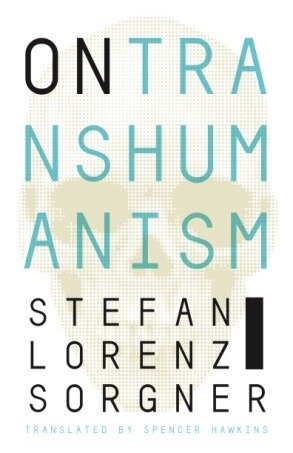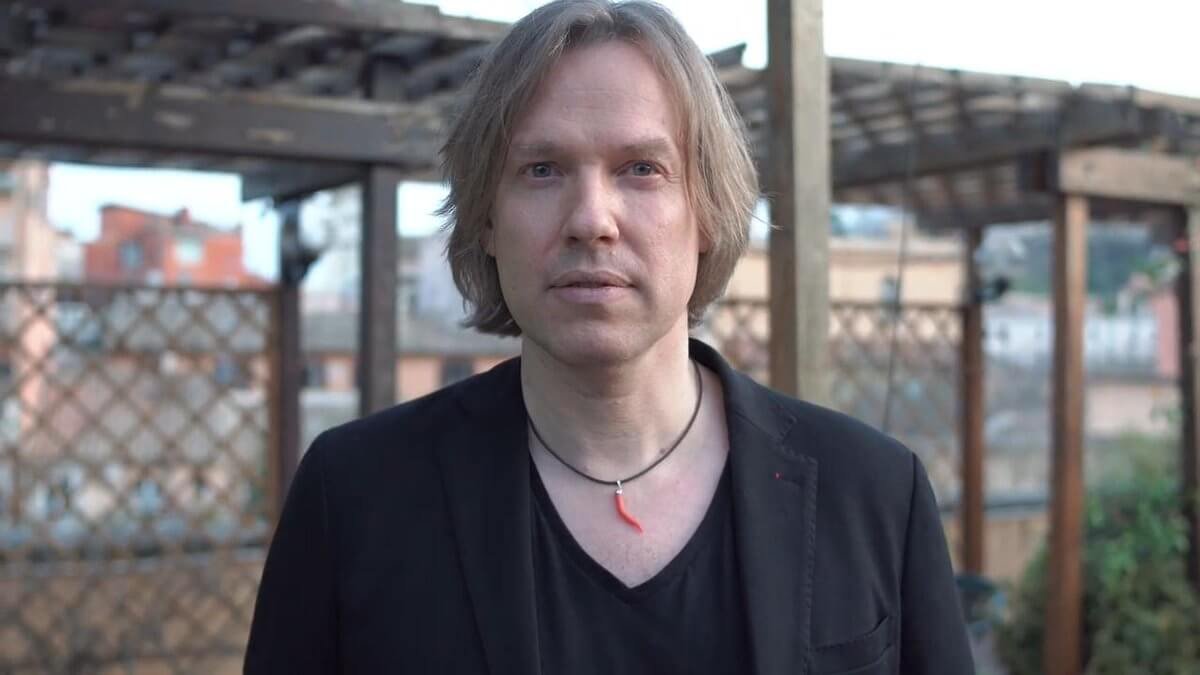Žarko Paić: How to determine your position in contemporary philosophy and especially in the context of German theoretical thought. Do you have your predecessors in some orientation like post-phenomenology or similar? Steve Fuller stresses that you have „the makings of becoming Peter Sloterdijk’s evolutionary successor.” Wolfgang Welsch highlights that you count “as one of the worldwide leading experts on trans- and posthumanism.” Gianni Vattimo enthusiastically points out that your explorations „of the philosophical meanings of post-humanism has become a point of reference that contemporary culture cannot ignore.“. I agree with these evaluations, although I would add that reading your texts I notice the tendency to overcome the boundaries not only of philosophical disciplines but also the very status of philosophy today within the so-called humanities.
Stefan Lorenz Sorgner: Nietzsche has always been a central figure for my intellectual development. I discovered him after reading Heraclitus at the age of thirteen. I had a book with the fragments of Heraclitus’ in which all of them were commented on with excerpts from Nietzsche, Plato, Spinoza, as well as Goethe. I have always felt at home in the writings of Heraclitus, and this made me turn to Nietzsche’s texts, too. By the age of 20, I had read all of Nietzsche’s major writings, some of them several times. Nietzsche still represents a central reference point for me. Whenever there are challenging intellectual issues, I turn to his reflections and engage with them, as they have enabled me to wake up from a great amount of widely shared intellectual slumbers.
During my undergraduate studies, I was at King’s College from the University of London, which made me deal with a great variety of reflections from analytical philosophers. Thus, I learned to appreciate the intellectual consistency of applied ethical reflections by utilitarian thinkers such as Peter Singer, even though I do not affirm a utilitarian approach myself. As a result of this engagement, I have eventually also become familiar with transhumanism. Transhumanism is closely connected to the various debates in the realms of Anglo-American analytical applied ethics. However, I think that transhumanist issues can best be dealt with by also considering a wider philosophical understanding of cultural issues, which is more closely connected to the continental philosophical tradition.
My doctoral supervisors were Wolfgang Welsch as well as Gianni Vattimo, who belong to the postmodern philosophical tradition, and who represent an outgrowth of the German philosophical tradition. It is this philosophical tradition to which I feel most strongly connected, as it includes the openness to wider cultural challenges. This supports your observation that the issues I deal with transcend the narrow boundaries of Academic philosophy, and can rather be seen as an engagement with the humanities while being critical of the dualistic prejudices on which the humanities have rested for a long period.
Žarko Paić: The key setting of transhumanism, according to Nick Bostrom, is precisely “uploading our consciousness into virtual reality” which will create the possibilities of interconnecting the human brain and computer simulation of events. Can we then still talk about the body as a condition of human thinking if the brain has already become virtually encoded in a network of events?
Stefan Lorenz Sorgner: I disagree with the judgement that mind-uploading is a key element of transhumanism. If this was the case, then the founder of transhumanism, Julian Huxley, who coined the term in 1951, would not be a transhumanist. The entire discussion concerning the relevance of mind-uploading can be compared to the discussion on the size of angels during the middle ages. During the middle-ages, Christianity was culturally dominant. People believed in angels. Hence, it made sense to reflect upon the issue of how many angels fit onto the tip of a needle’s pin. Nowadays, we live in scientific times. Hence, the discussion has come about on whether we can digitize our personalities. So far, we have no living digital entity. A living entity seems to be a prerequisite for conscious, self-conscious and feeling digital entities to come about. I do not see a plausible reason how this should occur during the next decades. Technological singularity is not near. We do not have to be afraid of AI’s putting us into a zoo. Mind-uploading is not an issue of pressing cultural relevance. There is some value in being engaged with it intellectually, as it enables us to think about who we are as embodied living beings. However, if we take it seriously as a pressing cultural issue, it stops us from dealing with the philosophical questions which are actually relevant, namely the question concerning the meaning of digital data, and whether privacy can be given up while we can uphold the relevance of the norm of negative freedom. Please let us talk about the relevance of privacy rather than about mind-uploading, which is merely a thought which helps Musk and his friends to get received by journalists, but which has no practical relevance whatsoever.
Žarko Paić: You argued in one of your texts that transhumanism goes along with a “secular, materialist, naturalistic“ understanding of the world. (Sorgner 2014: 30). Isn’t that perhaps the limit of this notion in its philosophical possibilities?

Stefan Lorenz Sorgner: Most transhumanists are computer scientists, biologists, or entrepreneurs. They do not have the education to develop complex philosophical reflections. A proper philosophy of transhumanism has been missing for a long time. This does not mean that the reflections put forward by transhumanists so far are without intellectual merit. This is not the case. Most transhumanists are highly intelligent, innovative, and active thinkers. I am merely stressing that this does not make their reflections proper philosophical one’s. Realizing the relevance as well as the limitations of traditional transhumanist reflections, I have approached the various angles of transhumanism as a philosopher. My monograph „On Transhumanism“ (Penn State University Press 2020) can be seen as a primer to philosophical transhumanism. „We have always been cyborgs“ (Bristol University Press 2022) „is both a comprehensive introduction to transhumanist thought and a clear-sighted vision for its future realisation.”, as Julian Savulescu (University of Oxford) stressed correctly. It is „one of the most detailed and comprehensive analyses available today“ when it comes to „gene editing, digital data collection, and life extension“, as N. Katherine Hayles (University of California, Los Angeles) pointed out. My next monograph will be entitled „Philosophy of Posthuman Art“ (Schwabe 2022) and will be concerned with the aesthetic dimensions of transhumanism.
Žarko Paić: Is the genealogy of transhumanism reducible to Nietzsche’s relationship to the issue of man’s transcendence in terms of the end of metaphysics, as Heidegger persistently interpreted, or do we need to consider the possibilities of thinking that affirm the necessity of emergent technologies in prolonging biologically determined life? I am thinking of your analysis of Nietzsche’s notion of the superhuman. How to free this notion today from the negative historical-ideological legacy of biology and eugenics?
Stefan Lorenz Sorgner: My reflections should not be seen merely as footnotes to Nietzsche and Heidegger. I am extremely critical of many elements of their thinking. At the same time, I also consider the latest technological developments as well as scientific developments, whereby I am interpreting them on a philosophical basis as well as from a wider cultural, ethical and philosophical perspective. I am twisting the great variety of insights that have been developed and realized in different disciplines into a new yarn, which can be referred to as a metahumanist approach, as it lies „beyond“ a dualistic understanding of humanism as well as „in-between“ trans- and critical posthumanism. „Meta“ covers both aspects of my approach, as it means both beyond as well as in between. While doing so, it is clear that I regard the norm of negative freedom as a central achievement whose relevance must always be cherished. Hence, totalitarian and paternalistic structures must be avoided. Therefore, it is clear that I reject any universal political decisions which ought to be seen as a grounding of a new version of eugenics. Eugenics needs to be clearly distinguished from the possibilities of genetic modifications which could be implemented in a liberal democracy.
Žarko Paić: When you advocate meta-humanism as an alternative to the dispute between post- and transhumanism, what do you intend to say with this approach to the problem of the relationship between the end of man, technoscience and philosophy?
Stefan Lorenz Sorgner: Three central insights have brought about the necessity to argue for metahumanism. The following worries concerning humanism, transhumanism, as well as critical posthumanism apply: 1. A dualistic understanding of humanism is extremely problematic due to its paternalistic and violent implications. Ontological dualities need to be transcended, which can be realized by twisting them. 2. Transhumanism in its most radical form is neither plausible nor desirable. Mind-uploading is not a realistic option within the forthcoming decades. If we aimed for a „Superman on Viagra“ or a „Wonderwoman on Botox“, we would merely get a hyper-humanism together with all of its problematic implications. 3. Critical posthumanism in its most extreme form demands that it would be best for the world, if human beings got extinct, as each additional human produces an enormous amount of carbon dioxide which further increases global warming.
At the same time, there are insights from all three movements, which have to be seen as plausible. We do have a mind, as otherwise, we could not feel, perceive or think. Humanism is correct in this respect. However, the mind is not an immaterial entity. A concept of an embodied mind needs to be developed. Transhumanism is correct in highlighting that human beings are fully part of evolutionary processes and that we ought to have the right to alter ourselves if we can reliably and safely do so. Critical posthumanism is right in stressing permanent becoming, inclusiveness, non-duality, non-anthropocentrism, non-foundationalism, non-essentialism, non-speciesism, non-aletheim, non-logocentrism, non-heteronormativety, perspectivalism, non-utopianism and plurality. My approach twists the various concepts and integrates them into a metahumanist philosophy
Žarko Paić: The posthuman condition, unlike the dehumanization of art, has an explicitly new ontological status. This is no longer an ethical-aesthetic judgment of the decadence of beauty and sublimity in art, but a new set of relationships between science, art, technology and life. We speak affirmatively about the aesthetics of transhumanism or is it just a description of new trends in contemporary art ‒ from Rinaldo and Stelarc to the so-called transgenic art?
Stefan Lorenz Sorgner: In my forthcoming book, I present a philosophy of posthuman art, which interprets a great variety of artistic phenomena from Stelarc over Kac to Piccinini and cryptoart. Thereby, it becomes clear that the dominant aesthetic theory of the past decades has lost its plausibility due to its paternalistic implications. Adorno’s, as well as the Frankfurt School’s aesthetics in general, are still stuck in an ontological dualistic mindset, which leads to paternalistic implications, as they imply the aesthetic prohibition of beauty as well as an intellectual snobbism. Both elements undermine a proper plurality and limit the possibilities connected with the great varieties of possible aesthetic expressions. What is particularly fascinating when it comes to the posthuman arts, is that they are usually critically engaged with our humanist past such that they seem to highlight the posthuman paradigm shift, which can most closely be associated with the full integration of human beings into the sensually accessible realm. Humans are no longer categorically separate from the natural world but merely gradually different from other natural entities. Thereby, posthuman arts hint at a new comprehensive understanding of the world, which turns them into total works of art. However, posthuman artworks do not affirm these new perspectives as foundational, and essentialist responses to ontological issues. They do have a self-distancing attitude concerning the validity of what they suggest. Hence, a poignant description of posthuman arts seems to be that they are non-totalitarian total works of art.
Žarko Paić: The ethical problem of placing homo kybernetes on the horizon of the absolute rule of biotechnology over human life requires a new approach to the relationship between humans and nature as a whole. Yet, is not bioethics always a step behind technological singularity? Does it make any deeper sense to limit transhumanism to the so-called boundaries of human-animal interactions when they are constantly moving?
Stefan Lorenz Sorgner: Technological singularity refers to the evolution of (usually embodied) silicon-based algorithms becoming independent of human intervention. Silicon-based transhumanists, like Ray Kurzweil, regard the future of evolution to be primarily related to this type of development. Biotechnological innovations are concerned with the alteration of carbon-based bodies. Carbon-based transhumanists regard the great variety of biotechnological innovations as particularly relevant for the future of personal flourishing. Most transhumanists share a naturalist anthropology. Hereby, it needs to be realized that not only the human-animal boundaries get eroded but also the boundaries between humans and algorithms. Consequently, the posthuman paradigm shift has descriptive as well as normative implications, as both our self-understanding needs to be revised as well as the normative guidelines for using emerging technologies, in particular digital and gene technologies.
Žarko Paić: Explain your thesis that we have never been human, which is in the title of your recently published book?
Stefan Lorenz Sorgner: The title of my most recent monograph is „We have always been cyborgs“. This implies that we have never been human, whereby the human stands for the dualist entity, which was our dominating self-understanding in the Western cultural realms. It implies that human beings consist of an immaterial mind and a material body, whereby animation is the decisive step for us becoming persons from having been things before. By means of animation, we become rational creatures capable of speaking, thinking and reasoning. Instead of this being the case by God attaching the divine spark to our bodies, since Darwin and Nietzsche an alternative anthropology has become more plausible. It implies that we turn rational by means of a parental upgrade. Parents and our cultural surroundings teach us the use of language. Thereby, we get upgraded. The upgrade continues further by going to school and by learning mathematics, history, and music. „Cyber“ comes from the Ancient Greek word for a helmsman, a steersperson of a ship. Hence, a cyborg is a steered or altered organism. We get altered through education and by means of getting upgraded with language in the first instance. Consequently, we have always been cyborgs, as language is what makes us who we are. However, us having a language is the result of a complex interplay between organic preconditions and our cultural surroundings upgrading us with language. The understanding that we have always been cyborgs represents a central paradigm shift away from traditional humanist prejudices.



Stefan Lorenz Sorgner
Stefan Lorenz Sorgner is the Chair of the History and Humanities Department and a philosophy professor at John Cabot University in Rome. He is director and co-founder of the Beyond Humanism Network, Fellow at the Institute for Ethics and Emerging Technologies (IEET), Research Fellow at the Ewha Institute for the Humanities at Ewha Womans University in Seoul and Visiting Fellow at the Ethics Centre of the University of Jena. Sorgner is editor of more than 10 essay collections, and author of the following monographs: Metaphysics without Truth (2007), Menschenwürde nach Nietzsche (2010), Transhumanismus (2016), Schöner neuer Mensch (2018), Übermensch (2019); On Transhumanism (2020); We have always been cyborgs (2022). In addition, he is Editor-in-Chief and Founding Editor of the “Journal of Posthuman Studies”.

